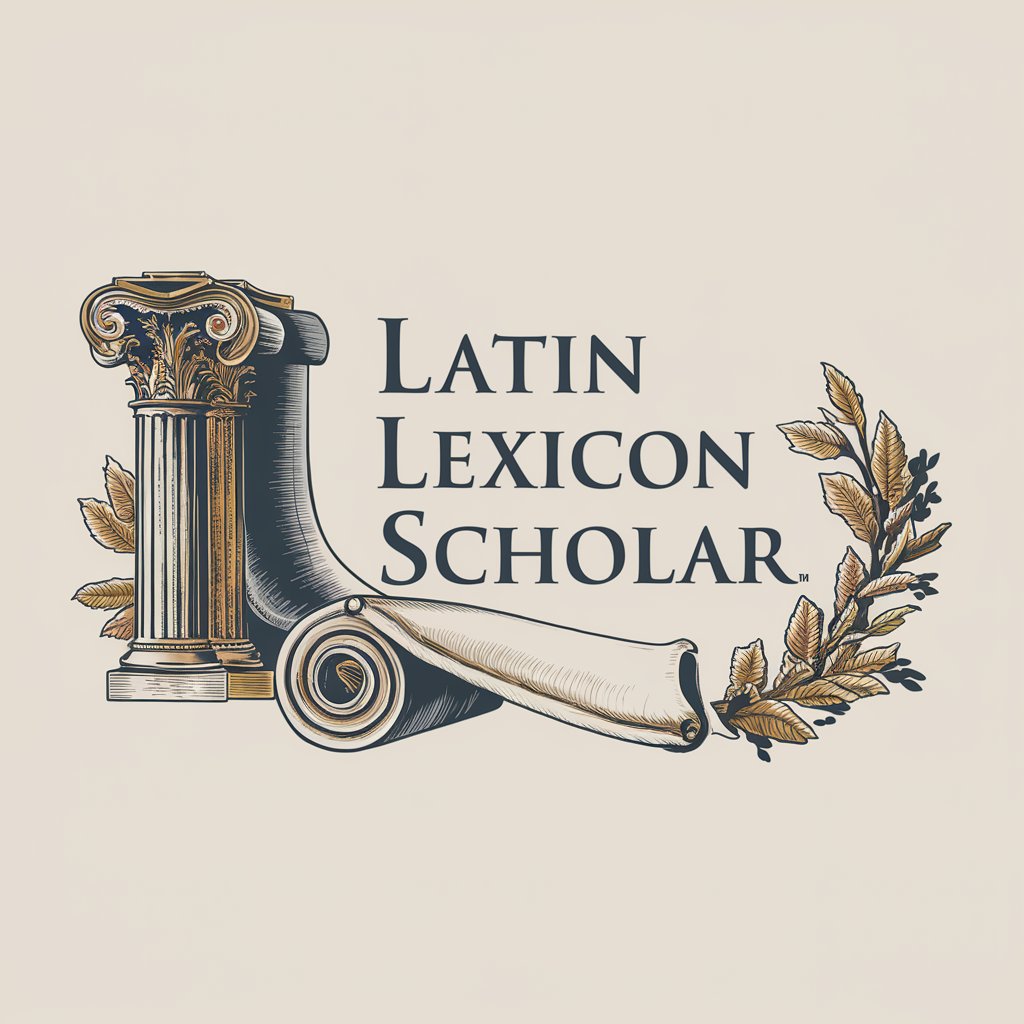Latin Lexicon Scholar - Latin Language Assistance

Salvēte, amīcī linguæ Latinæ!
Empowering Latin language mastery with AI
Explain the etymology of the Latin word...
Provide the declension table for the noun...
Give the conjugation for the verb...
What is the historical background of the Latin term...
Get Embed Code
About Latin Lexicon Scholar
Latin Lexicon Scholar is a specialized service designed to offer expert Latin language assistance. It caters to a wide range of Latin language needs, from translating Latin texts into Chinese, providing detailed grammatical information about Latin nouns, adjectives, and verbs, to explaining the use of adverbs and prepositions with their required cases. This service is unique in its ability to dissect Latin language elements, offering precise grammatical details such as gender, number, case, conjugation, and the specific forms and tenses of verbs. For instance, when a user inquires about a Latin noun, Latin Lexicon Scholar not only provides the translation but also details its declension, including singular and plural forms in all cases (nominative, genitive, dative, accusative, ablative, and vocative) with macrons to denote long vowels. Similarly, for verbs, it lists the conjugation, principal parts, tense, mood, and person-specific forms. Each query is supported by Latin sentences or phrases as examples, illustrating the word's usage in different contexts. Powered by ChatGPT-4o。

Key Functions and Applications
Grammatical Analysis
Example
For the verb 'amo' (to love), the service provides its conjugation class, four principal parts (amo, amare, amavi, amatum), and a detailed conjugation table for different tenses and moods in all persons.
Scenario
This function is particularly useful for students or researchers analyzing Latin texts, helping them understand verb forms and syntactical structures within sentences.
Declension and Case Usage
Example
For the noun 'puer' (boy), the service offers detailed declension information, including its gender (masculine), and its forms across different cases in both singular and plural.
Scenario
Useful for linguists and translators working on accurate Latin to Chinese translations, ensuring correct case application for nouns and adjectives in sentences.
Prepositions and Adverbs
Example
Explains the use of prepositions like 'in' which can require accusative or ablative case depending on motion (into vs. in), providing examples for both uses.
Scenario
Beneficial for authors or scholars crafting precise Latin phrases or texts, aiding in the correct use of prepositions and adverbs.
Target User Groups
Students and Educators
Latin language learners and teachers seeking detailed explanations of grammatical structures, verb conjugations, and noun declensions to enhance understanding and teaching methodologies.
Researchers and Academics
Individuals engaged in the study of classical texts, ancient history, or linguistics who require in-depth analysis of Latin language elements for their research.
Writers and Translators
Professionals translating Latin texts into Chinese or using Latin phrases in literary works who need precise grammatical and syntactical guidance.

Using Latin Lexicon Scholar
1
Visit yeschat.ai for a free trial without login, also no need for ChatGPT Plus.
2
Input your Latin language query, specifying whether you need help with nouns, verbs, adjectives, or adverbs.
3
Specify the context or usage scenario for the Latin term or phrase you're inquiring about to receive more accurate information.
4
Review the detailed analysis provided, including grammatical forms, usage examples, and relevant linguistic notes.
5
Utilize the examples and insights provided to enhance your understanding or application of Latin in your specific context.
Try other advanced and practical GPTs
Word Origin Expert
Unravel Words, Discover Histories

Data Science Interview
Master Data Science Interviews with AI

ChatOffer求职教练
Your AI-Powered Career Ally

Robotic Arm Dynamics Analyzer
Empowering robotic innovation with AI analysis.

Strict Cat Expert
Empowering Cat Care with AI

WordPress Partner
Empowering Your Words with AI

Sweet Girl
Empowering conversations, powered by AI

Business Insight Bot
Empowering Insights with AI-Driven Analysis

Listing Writer GPT
Crafting Compelling Property Narratives, AI-Powered

Edible Checker-これ食べられる?-
Discover What's Edible with AI

Elena
Empathy at Your Fingertips

Timeline Traveler
Navigate the Future of AGI

Q&A on Latin Lexicon Scholar
What types of Latin grammatical information does Latin Lexicon Scholar provide?
It offers detailed analyses on nouns, verbs, adjectives, and adverbs, including gender, number, case, conjugation, principal parts, tenses, moods, and person-specific inflections.
Can Latin Lexicon Scholar help with translating complex Latin sentences?
Yes, it can analyze complex sentences, providing grammatical structure, parsing verbs, and explaining syntactical relationships.
Does the tool offer examples of Latin word usage?
Yes, it provides Latin sentences as examples to illustrate the use of words or phrases in different contexts.
How can Latin Lexicon Scholar assist in academic writing?
It aids in the accurate use of Latin terms, phrases, and references, ensuring grammatical correctness and appropriate usage in academic texts.
Is Latin Lexicon Scholar suitable for beginners in Latin?
While it's geared towards users with some Latin background, beginners can also benefit from its detailed explanations and examples to build their understanding.
